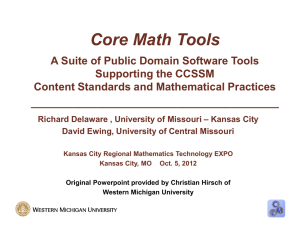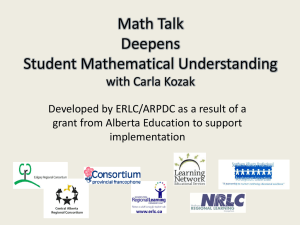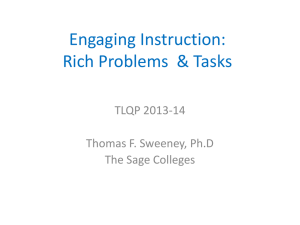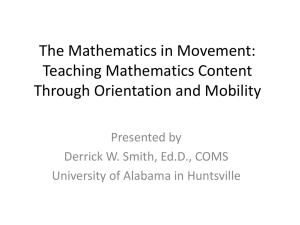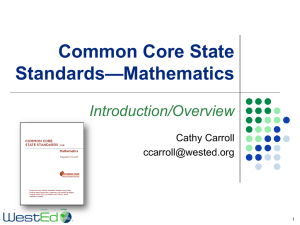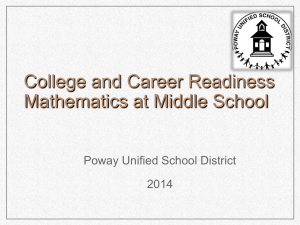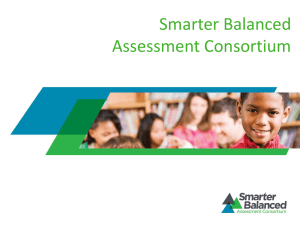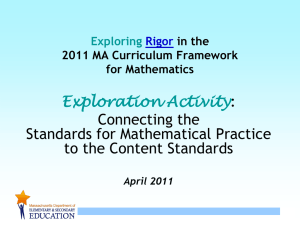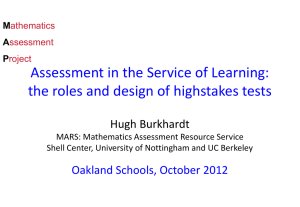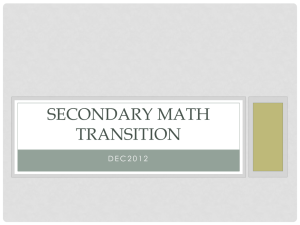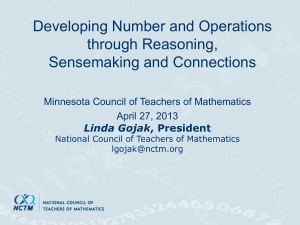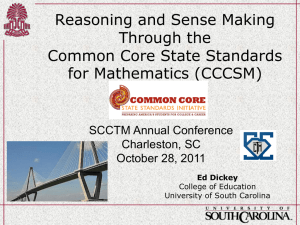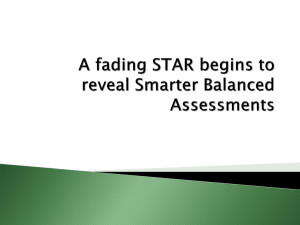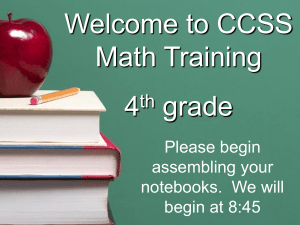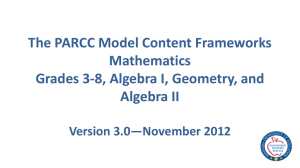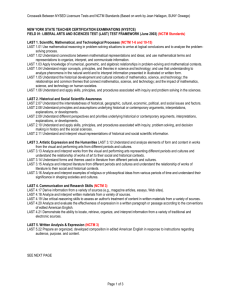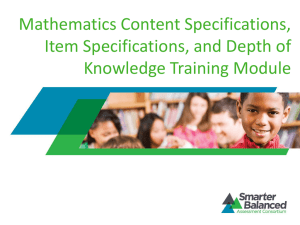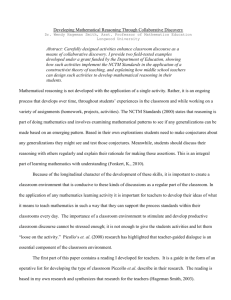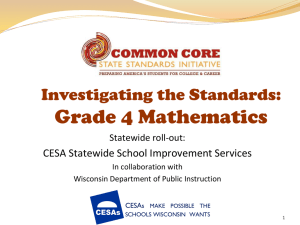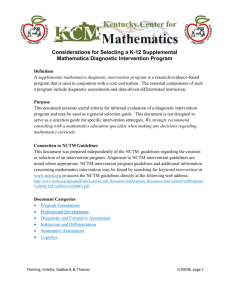What are Performance Tasks?
advertisement
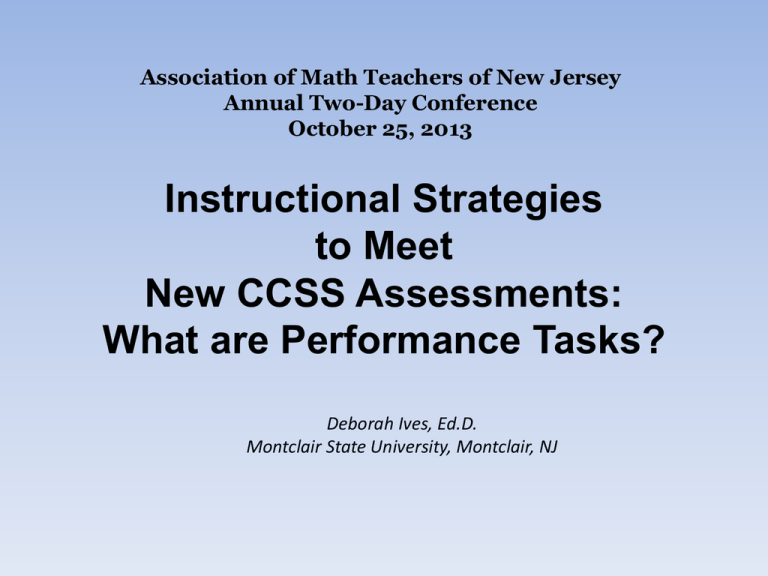
Association of Math Teachers of New Jersey Annual Two-Day Conference October 25, 2013 Instructional Strategies to Meet New CCSS Assessments: What are Performance Tasks? Deborah Ives, Ed.D. Montclair State University, Montclair, NJ How do you use math in your daily life? • How have you used math today? • How did you use math this week? • At home? • At work? • In your daily activities? How have you used technology today? This week? NCTM Focus in Mathematics: Reasoning & Sense Making • Many students have difficulty because they find mathematics meaningless… • Should occur in every mathematics classroom every day. NCTM 2009, pp. 5-6 Reasoning Habits of Mind “Attention to reasoning habits needs to be integrated within the curriculum to ensure that students both understand and can use what they are taught” • • • • Analyzing a problem Seeking and using connections Implementing a strategy Reflecting on a solution NCTM 2009, p.9 Problem Solving Common Core State Standards Define what students should understand and be able to do in their study of mathematics. –Standards for Mathematical Practices –Standards for Mathematical Content CCSSM (page 12) CCSS Mathematical Practices* Use Real World Applications to: • Make sense of problems and persevere in solving them. • Reason abstractly and quantitatively. • Construct viable arguments and critique the reasoning of others. • Model with mathematics. • Use appropriate (technology) tools strategically. • Attend to precision. • Look for and make use of structure. • Look for and express regularity in repeated reasoning. *Common Core Standards 2010 Overview of Mathematics Task Types PARCC mathematics assessments will include three types of tasks. Task Type Description of Task Type I. Tasks assessing concepts, skills and procedures • • • • Balance of conceptual understanding, fluency, and application Can involve any or all mathematical practice standards Machine scorable including innovative, computer-based formats Will appear on the End of Year and Performance Based Assessment components II. Tasks assessing expressing mathematical reasoning • Each task calls for written arguments / justifications, critique of reasoning, or precision in mathematical statements (MP.3, 6). Can involve other mathematical practice standards May include a mix of machine scored and hand scored responses Included on the Performance Based Assessment component III. Tasks assessing modeling / applications • 8 • • • • • • Each task calls for modeling/application in a real-world context or scenario (MP.4) Can involve other mathematical practice standards. May include a mix of machine scored and hand scored responses Included on the Performance Based Assessment component For more information see PARCC Item Development ITN Appendix D. Assessment Design English Language Arts/Literacy and Mathematics, Grades 3-11 2 Optional Assessments/Flexible Administration Diagnostic Assessment • Early indicator of student knowledge and skills to inform instruction, supports, and PD • Non-summative Mid-Year Assessment • Performance-based • Emphasis on hardto-measure standards • Potentially summative Performance-Based Assessment (PBA) • Extended tasks • Applications of concepts and skills • Required Speaking And Listening Assessment • Locally scored • Non-summative, required End-of-Year Assessment • Innovative, computer-based items • Required 9 What is a Performance Task? • A performance task is a goal-directed assessment exercise. • It consists of an activity or assignment that is completed by the student and then judged by the teacher or other evaluator on the basis of specific performance criteria. Real World Applications/Tasks & Technology Connections: Access Points for Every Student • • • • • • Music and Production Fashion Design Videogame Entrepreneurship Math in Basketball Math in Restaurants Math in Special Effects Get the Math Website www.getthemath.org • Full episode and video segments • Interactive challenges or performance tasks • Lesson Plans aligned to CCSS getthemath.org Math in Fashion Module • Featured professional: Chloe Dao, Season 2 Project Runway winner • Algebra I concepts: percent markup; writing and solving linear inequalities; cost analysis PARCC Online Resources: Prototype Project http://www.parcconline.org/samples /mathematics/high-schoolmathematics Dana Center: Task Type II Isabella’s Credit Card PARCC Resources: Blueprints and Evidence Tables http://www.parcconline.org/assessmentblueprints-test-specs Let’s look at Algebra I EOY Common Core Toolbox Assessment Resources www.ccsstoolbox.com Thank You for your participation! Any questions? deborah.ives.edd@gmail.com 24 Other Technology Resources • WNET’s Video in Teaching and Learning (VITAL) platform as selfpaced, student-directed lessons (http://vital.thirteen.org) • http://www.educause.edu/library/resources/college-readylearning-technologies (Next Generation Learning Challenge Technologies Catalog) • http://nextgenlearning.org/blog/19-promising-and-commoncore-aligned-tools-and-resources-middle-school-classrooms (NGLC Blog post) • Common Core State StandardsToolbox (www.ccsstoolbox.com) • www.insidemathematics.org • http://www.nctm.org and http://illuminations.nctm.org • http://www.mathedleadership.org • http://map.mathshell.org.uk/materials/index.php • www.mathsnacks.com

